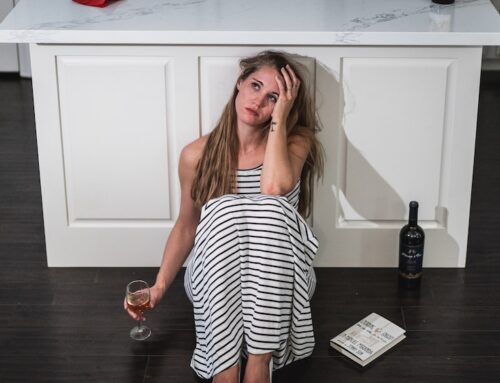7 Reasons Why I Thought AA Wasn’t for “Someone Like Me”
By Sam Dylan Finch
By the end, as we stood in a circle holding hands, I thought: “This is a cult, right? This has to be a cult.”
I hadn’t racked up any DUIs and I wasn’t drinking vodka every morning, so what did I need AA for?
I remember the first meeting of Alcoholics Anonymous that I ever attended, about three years ago. I’ll be honest — I wasn’t the friendliest face at that meeting. I had a ready criticism for just about everything that anyone said.
By the end, as we stood in a circle holding hands, I thought: “This is a cult, right? This has to be a cult.”
I asked the newcomer liaison — who I was convinced was just a recruiter for this undercover religious operation — how I could know whether or not I was an alcoholic, and if I really needed AA.
One thing she said in particular stood out: “Sometimes you aren’t ready, you know? Some folks go and do more ‘research’ and then a couple years later we see them in the rooms again.”
In hindsight, I have to chuckle. Of all of the advice she gave me, the only part I seem to have listened to was the part that justified drinking more. (I’d later learn that this is the exact kind of “selective hearing” that alcoholics are known for.)
I didn’t know it at the time, but her comment would foreshadow my journey to the letter. A few years later, after another catastrophic relapse, I remembered her words: If it was meant to be, I would be back.
“Sam, you could’ve died,” my therapist told me when I described my latest binge. That’s when I knew my “research” was over. It was time to go back.
I sat in the back row (another typical newbie move, I’d later learn), and just as the Serenity Prayer was being read, I saw the same woman from before — the one who predicted, whether intentionally or not, that I would be in those rooms again.
“I know you, right?” she said to me after the meeting.
“Yeah,” I replied, smiling. “And you’re a big reason why I came back. Because I knew I could.”
I didn’t know what to expect, but that didn’t matter; I was just grateful to have a place to go where I didn’t feel so crazy.
As time went on, I quickly realized that the reasons I believed that AA wasn’t for me weren’t just misguided, they were completely wrong. While I wish I’d had these realizations sooner, I’m grateful now for the fellowship I found when I was finally able to open my heart and mind.
So what, exactly, held me back the first time around? These are seven of the big reasons why I thought AA wasn’t for me — and what ultimately changed my mind.
1. I’m not Christian (or even religious).
Despite being told that your higher power in AA could be virtually anything, the “God” language was so off-putting that I couldn’t get past it at first. What I didn’t know was that AA is home to people with all sorts of beliefs, including atheists and agnostics (for whom a whole chapter in the Big Book is actually written).
But why would someone who wasn’t religious opt for a program that talks about a higher power?
The short answer? To get outside of ourselves. Part of what makes addiction so tricky is that we often get stuck in our own heads, leading us to miss the forest for the trees. A focus on some compassionate, loving force outside of ourselves allows us to take a step back from the addictive obsessing and see the big picture at work.
That “God” can be your own inner wisdom or spirit (you know, the tiny voice or gut feeling that says: “I shouldn’t be doing this”). It can refer to your fellowship (e.g. Group Of Drunks) and community, or it can even be the stars or your ancestors.
Whatever your higher power is, it exists to anchor you in the present moment, when your own thoughts are derailing you (part of what fuels cravings, I’ve found, is the mental obsession that goes along with them). Projecting your focus outside yourself can be a powerful tool in recovery.
2. Alcohol wasn’t my biggest problem.
I always thought of my alcohol abuse as a symptom of a problem rather than an issue in its own right. As someone with obsessive-compulsive disorder (OCD) and a trauma history (C-PTSD), I figured that if I got my mental illness under control, my drinking would somehow become normal again; that it would, in essence, “work itself out.”
As irrational as it sounds, I really believed that if I just “stayed mentally healthy” for the rest of my life, alcohol wouldn’t be a problem.
It should be a lot easier to sober up than to be perfectly happy and healthy 100% of the time, but the alcoholic mind doesn’t care about what’s actually possible — it just cares about drinking again.
I’ve learned with time that my alcoholism is very much a compulsive behavior. And once compulsions are activated, they’re only made worse when you engage with them. As a person with OCD, and therefore lots of compulsions, I know this better than anyone.
A lot of alcoholics look at every other issue in their lives as The Real Problem, while their drinking isn’t much more than an inconvenient and temporary side effect. But more often than not, the only “phase” we’re really talking about here is denial.
3. I figured I could manage on my own.
Here’s the thing: Whether or not you can manage sobriety on your own, why should you? If there’s an entire community of people, ready and able to support you, why deprive yourself of that resource?
These days, I ignore the voice in my head that says, “You don’t need this.” It’s irrelevant either way; I don’t need to muscle through this and there’s no good reason to.
This fellowship is a gift I can give to myself — the gift of unconditional acceptance, and an opportunity for continued personal growth in a supportive community.
4. I thought I was too young and “inexperienced.”
My drinking didn’t really take off until I was 21 years old. Yet by the time I was 24, I was at my first AA meeting. Was it possible to become an alcoholic in three years? I didn’t think so. I hadn’t racked up any DUIs and I wasn’t drinking vodka every morning, so what did I need AA for?
But my definition of alcoholism has evolved a lot since then. Alcoholism, to me, is a spectrum of experiences defined by two things: (1) psychological dependence on alcohol and (2) strong urges to drink (which we call “cravings”).
Drinking had become a coping strategy (one that often failed me) to deal with issues in my life. And rather than choosing to drink and choosing to stop — which is usually, on some level, premeditated and deliberate — I had the urge to drink, and that urge often had me behaving in ways that ran counter to what I planned or wanted, assuming I had a plan at all.
Sometimes I drank only to resolve the urge itself — an urge which could involve unbearable levels of anxiety, agitation, obsessing, and impulsiveness.
It took just a few years for my drinking to reach this level of unmanageability. And when it led me to be hospitalized twice in my early twenties, I realized that if I continued I would die before I ever considered myself “experienced” or “old enough.”
You are never too young or inexperienced to get sober. If there are signs that your drinking has become dangerous, you don’t need to wait to get support — and you shouldn’t.
5. I’m queer and transgender.
One of the biggest reasons why I rejected AA was because I felt, as someone who was both transgender and gay, that I would feel like an outsider. And while I can’t speak for every meeting in existence, I’ve been fortunate to find meetings where I could show up as my authentic self.
Living in the Bay Area, I’m privileged to now have access to meetings that are specifically for the LGBTQ+ community, though I regularly attend all kinds of meetings and have found them to be fulfilling in their own way. My sponsor is queer, too, which is incredibly empowering.
Many people I’ve known in other parts of the country have been able to connect with their local LGBTQ+ community center (either city or statewide) to get recommendations on which recovery spaces would be best for them.
Some LGBTQ+ centers even have AA meetings specifically on-site for the community.
The best way to find out is to call around. You don’t know what’s out there, and recovery is always worth the effort.
6. I take psychiatric medications.
As someone who takes medication for my mental health conditions, I was scared that people in AA would look down on me or believe I wasn’t really sober.
In particular, I rely on Adderall to manage my ADHD. I take it exactly as prescribed without any trouble. If I don’t take it, it’s difficult for me to keep up at my job because my concentration issues make my life incredibly unmanageable.
But Adderall is a stimulant and has a reputation as a drug of abuse. I worried that I would be pressured to stop taking it.
Instead, I’ve been given the exact opposite advice in AA. I’ve been told repeatedly that if my psychiatric medications contribute to my mental wellness, they are an essential and indispensable part of my recovery.
With mental health conditions frequently co-occurring with substance abuse, you’re likely to find a lot of people in AA who rely on these medications to maintain balance in their lives. So don’t be discouraged: you aren’t alone.
7. My history didn’t seem “bad enough.”
Sometimes I’d listen to a speaker talk about getting drunk at age 12, growing up in the foster system, or getting their second DUI, and I’d think to myself, “Why am I even here? My story is nothing like theirs.”
But as I attended more and more meetings, I began to see the similarities, rather than focusing so much on the differences. I realized that even the most extraordinary stories had some kind of wisdom to offer me, as long as I gave myself permission to be fully present.
As I heard a speaker say last month, “Bottom is when you stop digging.” Recovery begins when you’re open to it, not when you’ve passed some magical threshold of having “suffered enough.”
Your story is enough, exactly as it is in this moment. You don’t need to have the most tragic backstory, the biggest relapse, or the most catastrophic “bottom” moment.
You don’t have to earn a seat at the table. As I learned this last year, that seat will be there for you when you’re ready, no matter how many times you fall down or slip up.


